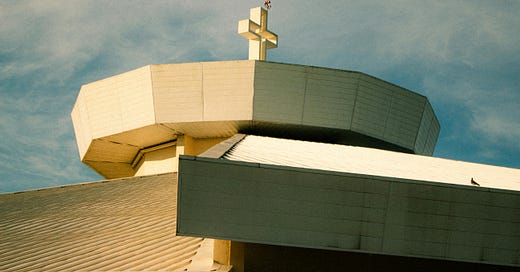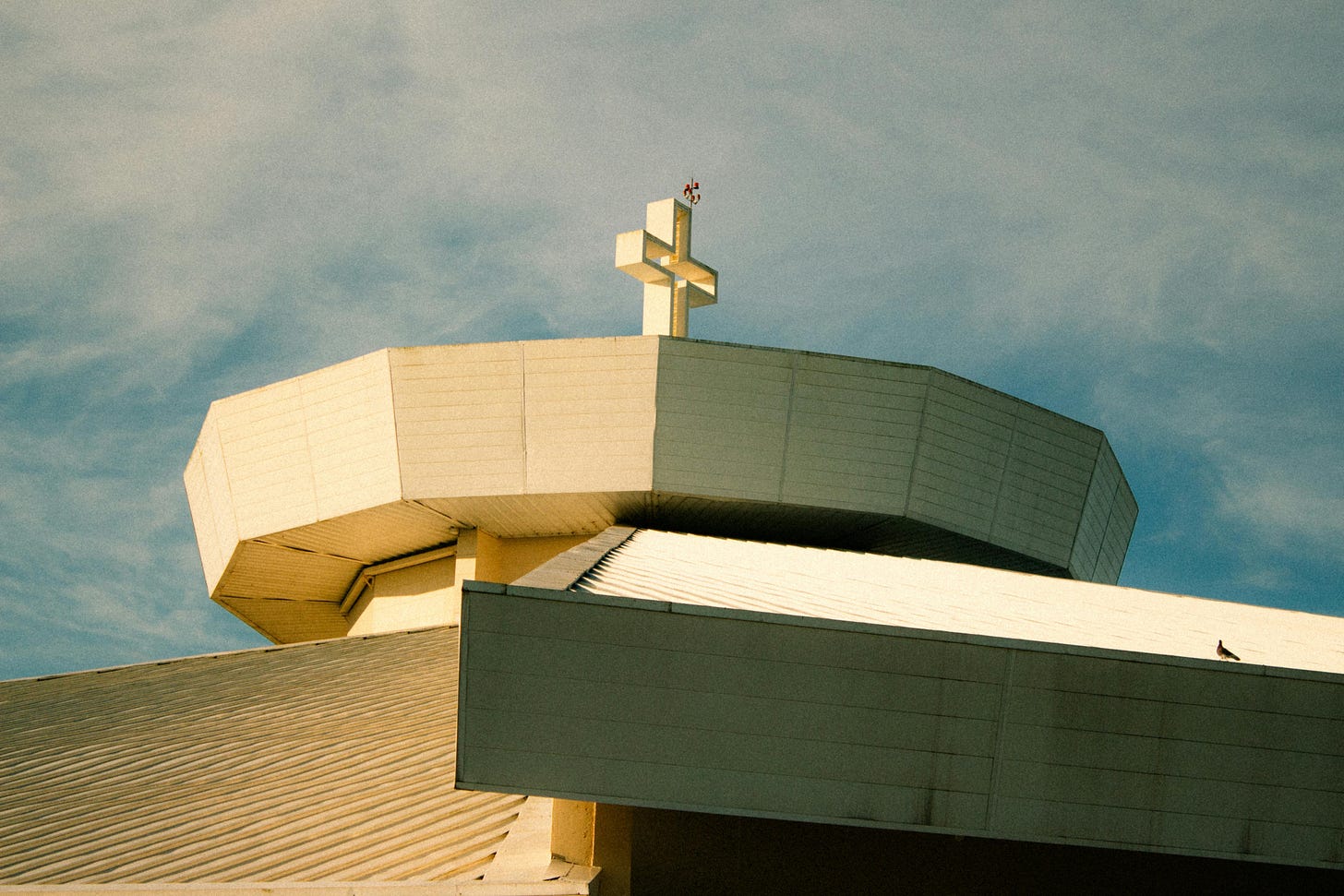I delivered my first sermon to an adult congregation at the age of nine and by the time I was fifteen, I was preaching in churches across the state.
I was short for my age and had to stand up very straight to see over the podium. Before I started speaking, there’d be a bemused expression on the adults’ faces. They seemed entertained by the novelty of what they were witnessing—a child preacher—though some looked anxious or puzzled.
But after a few minutes, all those eyes staring at me started to shift. The congregation would realize that this wasn’t a gimmick and the boy pacing the platform, thundering into a microphone, was serious as Heaven and Hell. They’d lean forward. They'd start to listen.
I’ve seen grown men stagger like drunks to the front of the sanctuary when I gave the altar call and I’ve seen women weep, their faces bright with tears. I’ve had adults shake my hand after the service was over and tell me how I led them to the Lord. This might have made some people proud, but the responsibility of that terrified me, the cosmic burden.
Before I preached, I would try to empty myself of sin. Even though I was just a boy living on a cattle ranch in rural Oklahoma, I imagined all manner of transgressions in my mind. I believed that if I climbed the short flight of steps to the platform and stepped into the pulpit with sin in my heart, God might strike me dead.
My childhood was a strange one. My father had been killed when I was eighteen months old—a train struck the pickup he was driving on the tracks of the Frisco Railroad in Tulsa. My mother developed problems soon after and, when I was seven, a judge awarded custody of me to her parents.
My grandmother was one of nine children and both of her sharecropper parents converted to the Pentecostal faith during the Dust Bowl years. They both became evangelists and later, pastors. My Aunt Mary Louise and Uncle Leroy pastored the First Pentecostal Church in Cleveland, Oklahoma that my great-grandparents had founded. As a child, my entire life was church and prayer meetings, revivals and Bible studies, facts of my existence just like cattle and crops.
When I was nine, Mary Louise was asked to hold a revival at a Pentecostal church in Seminole. I can still see it: the old oak pews and the stained orange carpet and the hymnals that cracked when you opened them. The sanctuary smelled of must and disinfectant and the sweet, floral scent of women’s perfume.
My Aunt Mary Louise was a short woman with large brown eyes and chestnut-colored hair that she wore in tight curls. She had high cheekbones and a plump, pretty face. Soft-spoken. A little shy. That all changed when she stepped into the pulpit and began to pace back and forth, microphone in one hand, her Bible clutched to her chest.
How the Spirit walked her around, transforming her hushed speaking-voice into an instrument of marvelous power. I wish you could have seen her, this petite grandmother from Mount Pleasant, Texas, gliding down from the platform to stride from one side of the sanctuary to the other, the congregation looking on in awe.
I remember watching her one winter night while she was holding that revival in January of 1981, sitting up straighter and straighter in my seat, then on the very edge of it. I’m not sure I’d really listened to a sermon before that. I felt an overwhelming urge to stand up and follow her as she walked the aisles, thundering.
Then, I tried to. We were sitting on the front row and I almost made it to my feet before my grandfather caught me by the rear belt loop of my church pants and tugged me back onto the pew.
“Sit down,” he whispered, but he wasn’t upset. I looked over and saw my grandmother smiling.
I sat there and listened. I hardly recognized the woman pacing there in front of me. I tried to stand up again and go to her, and again my grandfather caught hold of me. After my second attempt, he sat with one of his fingers hooked inside my belt loop in case I tried a third time.
When the service was over and we were standing in the parking lot, talking with my aunt and uncle, my grandfather looked over at Mary Louise and said, “Aaron kept trying to get up and follow you.”
Mary Louise nodded. “You should have let him,” she said.
*
I tried to follow Mary Louise as best I could, but when I was fifteen—around the time I began receiving more invitations to preach—I started to develop problems. Of course, the problems were already there, but the stress of stepping into the pulpit seemed to activate them. I told myself I had to be perfect; I had to be pure.
I thought about death an awful lot for a fifteen-year-old farm boy. Sometimes, I prayed for it. When I felt close to God and was fairly certain I’d go to Heaven if I died, I’d ask Him to blow out the guttering candle of my heart and let me join His eternal flame. I feared falling away. I was tortured by the suspicion that I stood on the cliff edge of an entirely different life, one filled with all the things my school friends cared about.
I entered puberty fairly late, and once I’d arrived in that world of pressing desire, I resented it. I’d always liked girls, but I didn’t understand what it meant to lust: a constant, oppressive ache. I walked around in a cloud of it. Part of me knew what I was feeling was perfectly natural, but the other part insisted that this new level of longing was wicked. I hadn’t known that this would happen to me. I hadn’t known my own body could betray me. If I’d had a father, I could’ve talked to him about it, but I was too ashamed to discuss all of this with my grandfather. You don’t talk about sex with your grandad: you talk about fishing.
For my friends, the rush of hormones was high. They fixated on girls and joked about masturbation and seemed to be enjoying themselves mightily. For me, there was only a gulf growing between me and God. The more I felt these base desires, the more they eroded my foundation. I was tormented by the fact that I felt these things at all.
Pentecostals live in a world of on or off, hot or cold, saved or damned. There’s no middle ground. And as celebrated evangelists were exposed as lascivious hypocrites—we heard sermons in our church about holiness, purity, about resisting the temptations of the World.
I remember calling Mary Louise. The thought of preaching had become something that paralyzed me with fear, and I asked if she’d ever felt that.
She told me that she was always afraid when she stepped into the pulpit.
She talked about how, in the Old Testament, the Hebrew priests would sew bells onto the hem of the High Priest’s garments and attach a rope to his ankle. When the High Priest walked into the inner sanctuary of the Tabernacle on the Day of Atonement to see if God accepted the Children of Israel’s sacrifice, the other priests would wait outside, listening for the jingling of those bells. If the bells stopped ringing, they’d know God had stricken the High Priest dead, and they draw out his corpse on the end of the rope.
“That’s how walking into the pulpit has always felt to me,” she said. “Part of me waiting for the bells to ring, part of me waiting for them to stop.”
*
The Bible told me I couldn’t serve two masters: a divided house wouldn’t stand. I knew I’d either become one thing or I’d become entirely the other. The idea that I could accept the other side of the house of my spirit never occurred to me.
I refused to end up like the televangelists I saw weeping on TV, justifying their sins and begging for money. I refused to be someone who felt one thing and preached another. If these desires blossoming in my blood separated me from God, I wasn’t going to pretend they didn’t. I’d go on, be a sinner, and accept my punishment.
In short, I became convinced I was going to Hell; I just didn’t know when I’d arrive. I decided to go on and acknowledge the corn and take the quickest route.
This was my plan to get there:
There’s a path that winds through the black oaks on the west side of our ranch. You wait until everyone’s asleep and then collect the duct tape from under your bed and the .22 pistol from its place in the pantry. You’ll have to go out the back door and you’ll have to be very quiet. If the dogs start barking, you’ll be in the nuthouse before dawn. If your grandfather catches you leaving with a pistol in your coat pocket, he’ll wear the ground out with you.
When the moon is bright, you follow the red dirt trail for half a mile and then cut off through the trees. The gunshot will set the dogs to howling, so you best find someplace you can bleed out in peace.
You snake through the woods for a while and then select a nice, tall oak, shinny up the trunk until you can climb from branch to branch. If you’ve made it this far, you can go the whole figure: wedge yourself in the fork of the tree, lash yourself to the trunk with the duct tape you brought. Once the bullet blows out your lamp, the tape will hold your weight, and they won’t locate your body until the smell of sulfur is strong in your nose.
That was the course I charted, but before I could make the journey, I started to disintegrate. It was a little like unplugging a table saw, standing there watching the blade turn slower and then suddenly go motionless. I turned down invitations to preach, and then I stopped attending revivals, and then I stopped going to church at all. I stopped doing other things too: schoolwork, hanging out with friends. Everything started going gray. It’s a strange experience to be a person, watching your personality dissolve.
I drifted for a long time and I was twenty-one before I stumbled across something that consumed me the way my faith once had. In a community college Literature class, I discovered words that spoke to me in the language of the divine. I was an apt pupil and soon, a fanatic. I decided I’d be a minister of these verses the way I’d once been of holy writ.
In graduate school, I began writing short stories, and what I knew best was backwoods churches in rural Oklahoma. Writing about the folks I grew up around and the ecstatic experience of Pentecostals, I began to find my way back to God. In composing stories about these sick, suffering souls, searching for spiritual relief, I lost my disdain for the community I was raised in and, finally, myself. I became a believer who’d managed to unite the divided house of his spirit, even as I waited for its inevitable collapse.
*
Mary Louise has been gone for a decade now. She lived into her eighties, healthy and happy for most of those years. The last time I saw her, I was a thirty-year-old college professor, having just published my first book of fiction. We prayed together and she said, “Aaron, I know that everything you’re doing with your writing and teaching, you’re still preaching the Word. I believe this is what God called you to do.”
That meant the world to me. Some day, I hope to tell her.







Aaron. That was excellent. I get that you're putting forward art, and so perhaps asking a practical question diminishes the intangible...zing? But here I go. I'm raising two little girls in the church and in the word. What did you need as a young boy that would have allowed the two sides of the house to talk (as you say), that would have rescued you from crippling fear and dread?
Gorgeous. Much resonates as a child raised in a Pentecostal household, a late bloomer, and one who early felt the depths of eternity in his attempts to ward off sin and live purely before God. Beautiful that your Grandmother still recognised your gifting and blessed it.